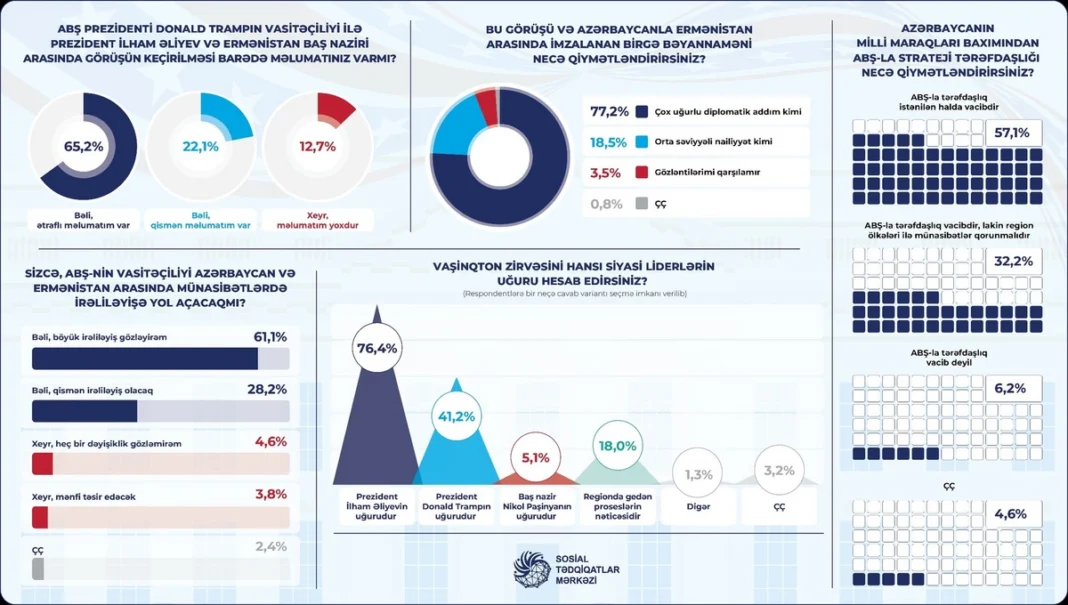BAKU, August 16 — A new survey by Azerbaijan’s Center for Social Research (STM) reveals overwhelming public support for the Washington summit between President Ilham Aliyev and Armenian Prime Minister Nikol Pashinyan, mediated by U.S. President Donald Trump. The findings underscore both public optimism for peace and confidence in Azerbaijan’s diplomatic trajectory.
Broad Public Awareness
According to the poll, 87.3% of respondents were aware of the Washington meeting, with nearly two-thirds stating they had “detailed information” about the talks. Only 12.7% of those surveyed said they were completely unaware of the summit.
This high level of awareness highlights the event’s prominence in national discourse, suggesting that the summit resonated far beyond diplomatic circles and was closely followed across the country.
Positive Diplomatic Assessment
The majority of respondents, 77.2%, characterized the summit and the signed joint declaration as a “major diplomatic success”. Another 18.5% described it as a moderate achievement, while just 3.5% said it failed to meet expectations.
The survey also found that 92.8% of respondents rated President Aliyev’s peace diplomacy highly, considering it purposeful and aligned with Azerbaijan’s national interests. Nearly two-thirds labeled it “very high,” reflecting broad confidence in Baku’s leadership on peace efforts.
Strategic Gains Highlighted
When asked about the summit’s outcomes, citizens pointed to a range of perceived benefits. Among the most significant were:
New economic and transport opportunities (90.4%)
Strengthened personal relations between Aliyev and Trump (90.1%)
Prospects for durable regional peace (89.3%)
Unobstructed connection between mainland Azerbaijan and Nakhchivan (89.3%)
Respondents also emphasized the development of strategic partnership with the United States (83.9%) and the normalization of ties with Armenia (82%). Many saw the summit as marking the beginning of a new political era in the South Caucasus (78%).
A Turning Point for U.S. Mediation
Optimism about Washington’s role was particularly striking. Nearly 90% of respondents believe U.S. mediation will help advance peace between Baku and Yerevan. A majority, 61.1%, expect significant progress, while 28.2% foresee partial improvements. Only 4.6% predict no change, and a small minority—3.8%—believe U.S. involvement may have negative consequences.
At the same time, 80.7% agreed that U.S. influence in the South Caucasus has grown as a result of the summit.
Credit for Success
Public opinion largely credited the achievement to President Aliyev’s leadership, with 76.4% naming him as the summit’s main driver. U.S. President Trump was cited by 41.2% of respondents, while Armenian Prime Minister Pashinyan was acknowledged by just 5.1%.
Notably, 85% of respondents described the Washington summit as a continuation of Azerbaijan’s victory in the Second Karabakh War, framing it as a political extension of military success.
National Interests and Regional Outlook
The poll confirmed that most citizens see U.S.–Azerbaijan strategic partnership as crucial: 57.1% regard it as vital to national interests under any circumstances, while 32.2% consider it important but emphasize balancing ties with regional partners. Only 6.2% dismissed the partnership as unnecessary.
When asked which countries hold decisive influence in the South Caucasus, respondents placed Azerbaijan (74.8%) and Turkey (64.6%) at the top, followed by the U.S. (44%). Russia, China, and Iran ranked far lower.
Methodology
The survey was conducted between August 9–14, 2025, among 1,100 respondents aged 18 and above, across 12 economic regions. Using a probability sample proportional to the national population, the poll had a margin of error of ±3% at a 95% confidence level. Interviews were conducted via computer-assisted telephone surveys (CATI), ensuring anonymity and voluntary participation.


